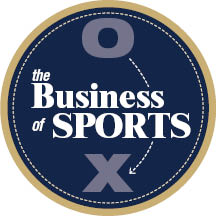The Rams are set to open a gleaming Inglewood stadium in 2019, but a federal lawsuit filed by the team’s former season-ticket holders in St. Louis is putting a damper on the franchise’s plan to generate new revenue.

A consolidated class action over monies paid for personal seat licenses (PSLs) by fans at the team’s old stadium, the Dome at America’s Center, claims the team owes refunds to nearly 50,000 season-ticket holders who shelled out money for deposits long before the Rams’ move back to Los Angeles. Many of the plaintiffs actually purchased their licenses back in 1995, the year the team arrived in town.
The PSL deposits – which reportedly cost more than $2,000 on average – guaranteed fans the right to purchase season tickets in a specific section at the St. Louis stadium through the 2024 season.
“(No) provision of the purported Rams Partnership contract allows the Rams to terminate the purported agreement without providing a refund,” one of the consolidated complaints reads.
The team denies the claims have any merit in its legal filings.
While a refund to the St. Louis fans is likely the best and most logical outcome the plaintiffs can hope for, another option could see the Rams transfer the St. Louis PSLs to the new Inglewood stadium.
Anthony Bruning, an attorney for the plaintiffs, said it has to be one or the other.
“Either the PSL owners’ contracts are still in effect and they have the right to buy season tickets in L.A., or the contract has been terminated, in which case the PSL owners are entitled to a refund,” he said.
A Rams spokeswoman declined to comment on the pending seat licensing litigation, which is taking place in Missouri. But she did confirm the team intends to sell PSLs for the Inglewood stadium. National Football League rules stipulate that can’t happen until January, however, in order to avoid unfair competition should the San Diego Chargers decide to join the Rams in Inglewood.
Bruning said the Rams should not be allowed to collect money on PSLs twice.
“Essentially, that’s double-dipping for nine years,” he said.
While personal seat licensing is typically pitched as a way to raise money for new stadiums, the underlying principle is basic supply and demand, according to Jeffrey Lenkov, a partner at downtown’s Manning & Kass Ellrod Ramirez Trester, and an expert on PSLs. If fans – and, maybe more importantly, corporate accounts – are itching to see your team’s games, there’s an opportunity to charge both premium ticket prices and something extra for the right to buy them.
“Why not charge prohibitive prices for tickets but also get a PSL fee from whatever part of the market is also willing to pay for that?” Lenkov said. “It’s a way to maximize luxury seats in a luxury market.”
Several NFL teams that recently opened stadiums have seen record windfalls from sales of PSLs. Whereas the Rams were charging around $2,000 for licenses when they moved to St. Louis in 1995, the San Francisco 49ers reportedly charged as much as $80,000 for PSLs when they opened Levi’s Stadium in 2014. Along with luxury box sales, PSLs generated $670 million for the team – money that doesn’t have to be shared with other teams under the league’s revenue-sharing model.
Lenkov, however, said the Rams will need to deliver a standout product in a crowded L.A. sports scene in order to command sky-high PSL fees.
“The market for PSLs will all depend on how the Rams look going into the new stadium,” he said. “If they look good, people will want to get in. L.A. is a winners’ town.”
Unsettled law
The plaintiffs in the St. Louis case have asked U.S. District Court Judge Stephen Limbaugh Jr. to enter a judgment in their favor on the pleadings. With the Rams’ reply due this week, an initial ruling could come soon.
However, Lenkov said the fans in St. Louis shouldn’t get their hopes up based on his interpretation of the PSL contract. He did note that other teams have since clarified language in PSL contracts to avoid these types of problems and are keeping a close eye on the litigation for guidance on how to proceed.
“I don’t think it’s a viable lawsuit long term,” he said. “But it does raise an interesting issue about what are the expectations for PSL contracts. Is it just a term or does it guarantee some right in perpetuity?”
With little case law on the topic, Bruning and other plaintiffs’ lawyers are hoping the judge decides to give them some semblance of victory in the wake of the Rams’ exit from St. Louis.
“This has been really a tragedy for the people of St. Louis,” Bruning said. “It’s a whole lot of rich people trying to get richer.”
